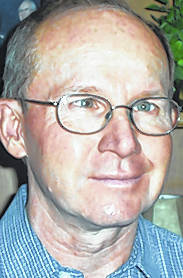The old Native American man sat in front of me as I was assisting him with his monthly sales tax report for his small produce business. He was probably only around sixty years old, but thirty years ago that seemed old to me. (It doesn’t sound old now.) I was working with the N.C, Dept. of Revenue in Laurinburg at the time. You could always get a good conversation going while doing reports for people. I can’t remember his name, (what else is new?) but I can remember the conversation.
“I’m a blessed man,” the man said while I was filing out his report. “God has been good to me. Me and my wife are in good health. My young’uns have good jobs and their families are doing fine. We have plenty to eat and I can pay all my bills. I sure am blessed.” And I was blessed just by talking to him.
The gentleman lived out in the country, a few miles out of town. His produce stand was out in front of his house. He and his wife lived in a neat, but small old cinder block house. His car and pickup were several years old. The casual observer passing by would think that whoever lived there was poor and in need, and from outward appearances it would seem to be so. But outward appearances can be deceiving.
We all know that it can be deceiving. We know, or know of, people who live in big, nice houses and drive expensive cars, but their personal lives are a wreck. And our culture tells them, and us, just get a bigger house and a more expensive car. Then everything will be better. But it isn’t.
I’m sure everything wasn’t perfect for that produce man from Laurinburg. But I sensed something in him that was important. Important enough that today I can still remember him sitting in my office thirty years later. That something was contentment.
In the Bible, the apostle Paul wrote about contentment in his letter to the Philippians. Remember that he was in prison when he wrote, “For I have learned in whatever state I am, to be content.”(Phil. 4:11) At one time Paul was one of the most influential and powerful Jewish leaders. He thought if he could get rid of all those Jesus followers, he would be content. But he wasn’t.
Now he was a prisoner in a filthy Roman prison for being a Jesus follower. But knew contentment. Notice he had to learn it. It didn’t just happen, and it didn’t come easily. Often people think contentment means settling, just accepting the status quo. Not Paul. He wasn’t going to do that. Earlier in the same letter he wrote, “I press toward the goal for the prize of the upward call of God in Christ Jesus.” (Phil. 3:14)
So how did Paul and the produce man, who impressed me so much years ago, learn contentment? Life can teach you what’s important, and what’s not. For the Laurinburg produce man and the Apostle Paul, there was something more that gave them contentment. It was a relationship. The produce man talked about how good God had been to him and how blessed he was. There was a relationship there. Paul knew that relationship, too. He said it was hard to understand, but that it was real. In that same prison letter he wrote, “And the peace of God, which surpasses all understanding, will guard your hearts and minds through Christ Jesus.” (Phil. 4:7)
Now I’m not saying that you have to be poor or in prison to be content. Having stuff is nice, and it sure makes life a lot more comfortable. And there are many prosperous people who know the same contentment that Paul and the produce man from Laurinburg knew. But it’s a contentment that is not achieved by the abundance of their possessions. That produce man told me all about it.

